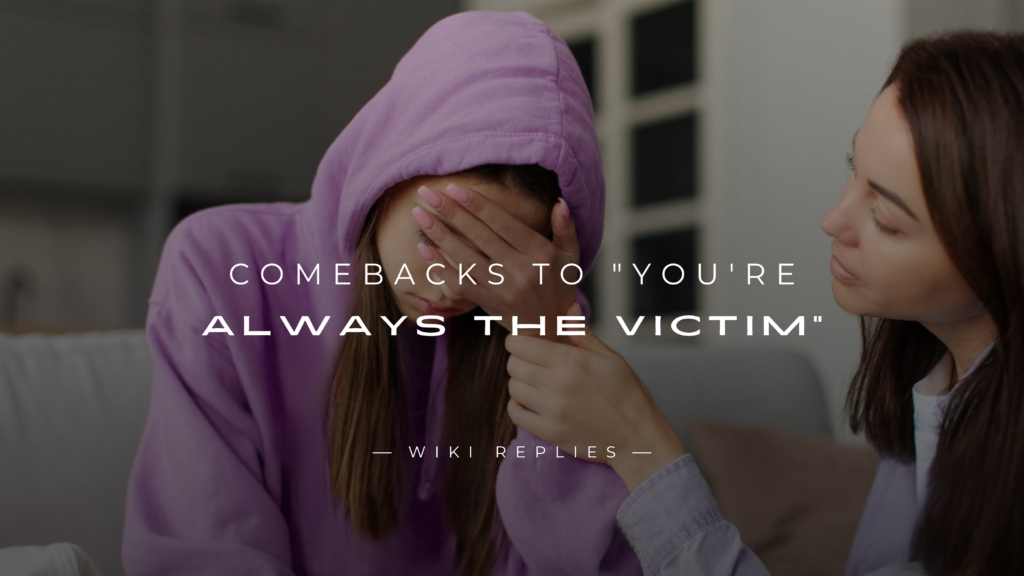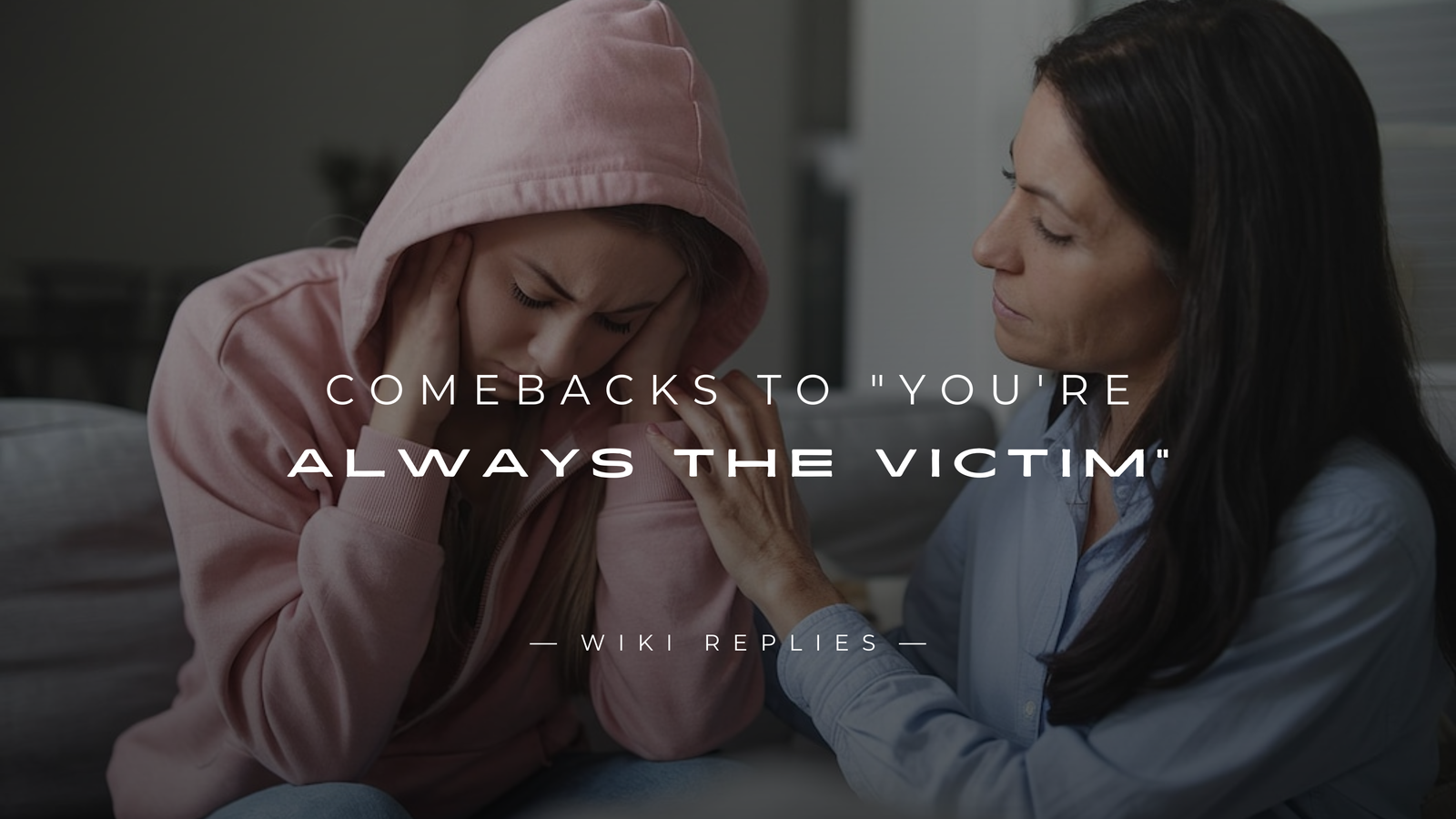Let’s be honest, few phrases can feel as emotionally invalidating and frustrating as hearing someone say, “You’re always the victim.” It often comes at a moment when you’re trying to express pain, discomfort, or confusion, and suddenly, you’re cast as dramatic, manipulative, or someone who never takes responsibility. The real sting? It shuts down any possibility of a real conversation and leaves you questioning your own emotional reality.
If you’ve ever been on the receiving end of this accusation, you know exactly how unfair and disempowering it can be. That’s why knowing how to respond is so important. This guide will walk you through why people use that phrase, what they might be trying to achieve, and how you can respond assertively, wisely, and confidently without stooping to their level or letting yourself be silenced.

220+ Comebacks to “You’re Always the Victim”
Clarifying Comebacks
- I’m not playing the victim, I’m explaining my side.
- Just because I bring it up doesn’t mean I’m making myself a victim.
- You’re misunderstanding me. I’m pointing out what hurt me, not blaming everything on others.
- Me expressing something painful isn’t the same as asking for pity.
- I’m not claiming to be innocent, I’m telling you how this affected me.
- Noticing a pattern isn’t the same as playing victim.
- I’m not assigning fault, I’m describing my experience.
- You’re calling it victimhood, but it’s actually vulnerability.
- I’m not saying I’m flawless, just that this situation wasn’t okay.
- I’m explaining, not accusing.
Reflective Comebacks
- Why does it bother you so much when I speak up about how I feel?
- Do you feel like you can never be wrong in a situation?
- Maybe you’re seeing me as a victim because you’re not used to me speaking up.
- Is it possible you’re projecting something onto me right now?
- Why does calling me the victim help you feel right here?
- What would it look like if you just listened instead of labeling me?
- Does hearing my pain make you uncomfortable?
- I wonder if this reaction is more about your discomfort than mine.
- If roles were reversed, would you say the same thing to yourself?
- Have you thought about how dismissing my feelings affects our trust?
Sarcastic Comebacks
- Yep, it’s all part of my grand master plan to win Victim of the Year.
- Oh no, you caught me being human again.
- Right, because having emotions is clearly a crime now.
- And you’re the judge, jury, and therapist, huh?
- Guess I should’ve just kept quiet and smiled through it all.
- Wow, so vulnerable of me to express feelings. How dare I.
- You know me, always plotting my next sob story for attention.
- Yeah, because calling out issues makes me evil, right?
- Please let me know the next time I’m allowed to feel something.
- Well excuse me for not bottling it all up like a robot.
Empathic Comebacks
- I know this isn’t easy to talk about for either of us.
- I’m not trying to blame you. I just want you to understand how I feel.
- I get that this is frustrating, but I’m hurting too.
- I wish we could talk about this without one of us being “the bad guy.”
- I don’t need to be seen as a victim. I need to be heard.
- Can we try to understand each other instead of labeling feelings?
- I know we both have pain in this, and I want to work through it.
- This isn’t about winning. It’s about healing.
- I’m sorry it feels that way to you. That’s not my intention.
- I’m not looking for sympathy, just connection.
Boundary-Setting Comebacks
- I’m not going to keep having this conversation if you dismiss how I feel.
- Calling me a victim isn’t constructive. Let’s talk when that stops.
- That label isn’t fair, and I won’t let it define this conversation.
- If you can’t respect my perspective, we need to pause this.
- I deserve to express myself without being insulted.
- That’s a line I won’t tolerate being crossed anymore.
- You’re allowed your view, but you don’t get to rewrite my reality.
- I won’t keep engaging if you reduce everything to blame.
- My emotions are valid, even if you don’t agree with them.
- Labeling me shuts down the conversation, and I’m not okay with that.
Logical Comebacks
- If I was always the victim, I wouldn’t be taking ownership like I am.
- I’m pointing out a specific issue, not playing a pattern.
- That statement ignores the facts of what actually happened.
- Being hurt by something doesn’t make me the villain or the victim.
- If we step back, maybe we can both see what went wrong without labels.
- Feelings aren’t facts, but they’re still part of reality.
- Let’s talk about what actually happened, not character roles.
- Just because I’m reacting doesn’t mean I’m dramatizing.
- If we base this on evidence, my concerns are valid.
- Avoiding accountability by calling me a victim doesn’t solve anything.
Mirror Comebacks
- You calling me a victim kind of makes you the attacker, doesn’t it?
- Interesting how I’m the victim and you’re always the misunderstood one.
- Sounds like you’re playing the rescuer in your version of the story.
- When you flip the roles, do you still sound as right?
- Funny, I could say the same thing about you.
- Seems like you’re making yourself the hero by making me the victim.
- You calling me the victim is just your way of staying blameless.
- We all play roles. You just like yours better.
- You’re quick to label me—why not look at your part too?
- I’m not the only one in this dynamic, you know.
Calm Disengagement Comebacks
- I’m not here to argue about labels.
- We can talk again when this stops being about blame.
- Let’s pause here. This isn’t going anywhere helpful.
- I’m done explaining myself to someone who won’t listen.
- This energy isn’t good for either of us.
- Let’s take a break and come back with clearer heads.
- I’ll step away for now—this feels too charged.
- I don’t think either of us are hearing each other right now.
- We’re not solving anything like this.
- I care about us, so I’m walking away before this escalates.
Self-Advocacy Comebacks
- I have every right to speak up when something feels wrong.
- My emotions are just as valid as yours.
- I’m not playing a role—I’m living my truth.
- I’m allowed to acknowledge pain without apologizing for it.
- I won’t shrink just because it makes you uncomfortable.
- I get to have a voice in my own story.
- My experience matters, even if it’s not convenient for you.
- I will not silence myself to protect someone else’s comfort.
- I know my worth, and I won’t let you minimize it.
- I won’t accept guilt for having boundaries or feelings.
Humorous Comebacks
- Oh no, I left my victim cape at home today.
- Great, now I just need a tragic backstory and a soundtrack.
- If being honest makes me a victim, I should probably start a podcast.
- Wow, finally getting the recognition I deserve. Do I get a trophy?
- I was going for emotionally mature, but victim works too, I guess.
- I must’ve missed the meeting where we decided I play the victim now.
- Plot twist, I’m actually the villain in Act 2. Stay tuned.
- If I’m the victim, who’s playing the dramatic music in the background?
- Hold on, let me cry dramatically so the scene really hits.
- Welp, I guess being self-aware is now called being a victim.
Reframing Comebacks
- I’m not being a victim, I’m just not brushing things under the rug anymore.
- I’m not trying to win anything here. I’m trying to be real with you.
- This isn’t about blame, it’s about understanding where I’m coming from.
- I’m not playing a part. I’m being a person who’s been impacted.
- Maybe it looks like that to you, but to me it’s about finally speaking up.
- I’m not looking for sympathy, I’m looking for clarity.
- I’m allowed to feel hurt without it being a performance.
- I’m not the victim. I’m someone trying to work through pain with honesty.
- This isn’t about fault, it’s about how we move forward.
- It’s not victimhood, it’s called accountability—mine and yours.
Confidence Comebacks
- I know who I am, and that label doesn’t define me.
- If speaking the truth makes me a victim, so be it. I stand by it.
- That won’t shut me down. I’ll still say what needs to be said.
- You can call it what you want, but I’m still standing in my truth.
- I’m not here for pity. I’m here for honesty.
- Say what you want, but I won’t let shame control me.
- I don’t need permission to own my feelings.
- Your opinion doesn’t cancel out my experience.
- I’ve done the work to know this isn’t about being a victim.
- I won’t let your discomfort define how I express myself.
Silencing Comebacks
- That kind of comment shuts things down, not moves them forward.
- If that’s how you want to frame it, this conversation’s done.
- Labeling me like that ends the possibility of real connection.
- I’m not continuing this while you reduce my experience to a cliché.
- We’re not getting anywhere with that kind of judgment.
- I won’t keep explaining myself to someone who’s already decided I’m wrong.
- If you keep calling me the victim, there’s no space for truth here.
- I don’t do name-calling disguised as feedback.
- That label is a wall, not a door.
- You’re not listening. You’re shutting me up with a tag.
Questioning Comebacks
- What makes you think I’m always the victim?
- Can you point to when I made myself the victim rather than just expressing hurt?
- Are you saying I’m not allowed to be affected by things?
- Does my honesty feel threatening to you somehow?
- Why do you assume emotion equals victimhood?
- Have you considered why you’re so quick to label me that way?
- What if I’m just reacting normally to something that isn’t okay?
- Do you think calling me that helps the situation?
- What would you prefer I do instead of speak up?
- Who benefits when my feelings get dismissed like that?
Disarming Comebacks
- I’m not here to argue. I just want us to understand each other.
- I’m not interested in blame. I’m interested in progress.
- This isn’t about sides. It’s about being honest with each other.
- I’m not trying to be right, I’m trying to be real.
- Can we step away from labels and just talk human to human?
- I’d rather connect than compete over who’s more wronged.
- Let’s pause on the judgments and focus on what we’re both feeling.
- If we drop the roles, maybe we can actually solve this.
- I’m not attacking, I’m opening up. There’s a difference.
- I want resolution, not drama. Can we agree on that?
Truth Bomb Comebacks
- People often say “you’re the victim” when they’re avoiding accountability.
- It’s easier to label someone than face how you may have hurt them.
- I’d rather be seen as the victim than become someone who blames others to avoid guilt.
- Calling me the victim is a clever way to avoid your part in this.
- This isn’t about drama, it’s about you not liking what I’m saying.
- You use that label every time I bring up something valid.
- The real issue is that my truth makes you uncomfortable.
- You’re not upset that I’m acting like a victim, you’re upset that I’m no longer silent.
- When people don’t want to change, they attack the person asking for it.
- I’m not the victim here. I’m the mirror.
Compassionate Comebacks
- I know this is hard to hear, but I’m not trying to make you the villain.
- I care about you and that’s why I want to talk about this honestly.
- We both hurt sometimes, and we both deserve space to say so.
- I’m not blaming you. I’m just sharing what’s real for me.
- Let’s try to support each other instead of assign roles.
- I’m doing my best to say this without making it a fight.
- I believe we can work through this if we both stay open.
- I’m not perfect, and I’m not asking you to be either.
- I just want to feel safe sharing with you, not be judged for it.
- Maybe we’re both carrying something heavier than we show.
Pattern-Breaking Comebacks
- You know what, maybe we should stop repeating this script.
- Let’s do something different this time. No blame, just real talk.
- I’m tired of this same loop. Aren’t you?
- What if we tried listening instead of labeling for once?
- Can we break out of this tired pattern and actually hear each other?
- I’m done playing roles. Let’s talk like two people, not characters.
- This feels like a rerun. Let’s change the channel.
- I won’t respond the way I used to. That’s growth, not victimhood.
- We don’t have to keep choosing the same reaction.
- Let’s stop doing what keeps breaking the connection.
Ownership Comebacks
- I can own my part, but I won’t take blame that isn’t mine.
- I’m responsible for how I feel, not for how you choose to react.
- I’ve made mistakes, sure. That doesn’t mean I’m playing a role.
- I’m not claiming to be perfect. I’m just not willing to be dismissed.
- I’m working on me. Are you working on you?
- I own what’s mine. That’s why I’m speaking honestly.
- I’m not shifting blame. I’m sharing my truth.
- I’m standing in accountability, not hiding in victimhood.
- I know I have things to improve. That doesn’t cancel what hurt me.
- I’m here owning my voice, not asking for pity.
Ally-Shifting Comebacks
- You don’t have to be against me to understand me.
- If we stopped fighting sides, maybe we’d find a solution.
- I’m not your enemy. I’m someone who wants to be heard.
- You don’t have to defend yourself to support me.
- This doesn’t have to be a battle. It can be a bridge.
- You can be on my side without being wrong.
- We could fix this a lot faster if we were on the same team.
- Maybe instead of pointing fingers, we could offer hands.
- What if we supported each other’s growth instead of judging it?
- You’re not losing power by listening. You’re gaining trust.
Ice-Cold Comebacks
- That says more about you than it does about me.
- Thanks for the diagnosis, but I’ll pass on your opinion.
- Interesting take. Doesn’t make it true.
- You can say that if it helps you sleep.
- That comment? Weak and predictable.
- Keep talking like that. You’re showing me exactly who you are.
- Cool. Now say something real.
- I’ve heard better gaslighting from amateurs.
- If dismissing me gives you power, you’re more fragile than I thought.
- That’s not insight. That’s avoidance dressed up as clever.
Perspective Comebacks
- Maybe from where you’re standing it looks that way, but you’re not in my shoes.
- Can we admit there’s more than one version of this story?
- Your perspective isn’t the only one that counts.
- From your angle, I get it. But there’s more to the picture.
- If you could see it through my eyes, you might understand.
- We’re looking at the same event through different filters.
- You don’t have to agree to at least try to understand.
- Our views clash, but that doesn’t mean mine is victimhood.
- You saw it one way. I lived it another.
- You’re judging a snapshot. I’ve lived the whole film.
The Psychology Behind “You’re Always the Victim”
- Gaslighting and Emotional Manipulation
When someone says “You’re always the victim,” it’s often not a helpful observation. More often, it’s a subtle form of gaslighting, designed to make you doubt your reality. It implies that your pain is either imagined or exaggerated. Gaslighting works by making you question your memory, your perception, or your feelings. In this context, it sends the message that your experience is invalid, that you’re overreacting, or worse, using your feelings as a weapon.
This phrase turns the emotional tables. You might be expressing real hurt about how you’ve been treated, but suddenly the focus shifts to your character rather than the situation. This manipulation tactic is often used to protect the other person’s ego or to avoid accountability.
- Projection and Deflection Tactics
Another psychological layer to this phrase is projection. Often, the person accusing you of playing the victim is actually the one who refuses to take responsibility for their own role in the conflict. They project their guilt, shame, or fear of blame onto you.
When someone doesn’t want to face the discomfort of acknowledging their mistakes or toxic behavior, it’s much easier to turn it around and say, “You’re always the victim.” That way, they don’t have to self-reflect or change. They can stay in control and cast you as the one with the problem.
When Someone Says This to You — What’s Really Going On?
- Identifying Intent: Criticism or Control?
Not everyone who says this is automatically manipulative. In some cases, they might be frustrated and genuinely trying to offer feedback, albeit poorly. The key is figuring out their intent. Are they speaking from a place of love and concern, or are they using this phrase as a control mechanism?
If the statement comes during a heated moment, it might be emotionally charged but not necessarily manipulative. However, if it’s a repeated pattern, if it’s used every time you bring up an issue, or if it makes you feel consistently belittled, then you’re likely dealing with a control tactic.
- Is It a Pattern of Dismissal?
Think back to past interactions. Do they often interrupt you? Do they change the topic when you express discomfort? Do they turn every issue back on you? If the answer is yes, you’re not just facing a one-time misunderstanding. You’re dealing with someone who habitually dismisses your feelings to maintain the upper hand.
This is a red flag, especially in close relationships like romantic partners, family, or even long-time friends. Being regularly labeled as “the victim” for expressing your truth is a tactic to silence and dismiss.
Before You Respond, Take a Breath
- The Power of the Pause
When someone accuses you of being the victim, your instinct might be to defend yourself or argue. That’s totally natural. But before you jump in, pause. Take a breath. Let that moment of silence create space for a more grounded response.
That pause does a few powerful things. First, it shows you’re not reactive. Second, it allows you to gather your thoughts. Third, it subtly communicates that you’re not going to be easily manipulated. You’re calm, composed, and in control of yourself.
- Grounding Yourself Emotionally
Remind yourself that your feelings are valid. You are not overreacting for feeling hurt or misunderstood. Take a moment to ground yourself emotionally by saying internally:
- I am allowed to speak up when I feel disrespected
- My emotions are real and worthy of attention
- I will respond, not react
Grounding gives you the clarity and strength to reply effectively rather than emotionally.
Smart and Assertive Comebacks That Shut It Down
Here are some calm but powerful ways to respond when someone tells you, “You’re always the victim.” Tailor your words depending on who you’re speaking to and the context of the conversation.
Comebacks for Narcissistic Behavior
- “If setting boundaries makes me a victim in your eyes, then maybe you’re too used to crossing them.”
- “Calling me the victim doesn’t make your behavior right.”
- “I’m not playing the victim. I’m reacting to being hurt. That’s not the same thing.”
Comebacks for Friends or Family
- “I’m not trying to be the victim. I’m trying to be heard.”
- “Labeling me doesn’t solve anything. Let’s focus on what I’m actually saying.”
- “This conversation isn’t about blame. It’s about how I feel. Can you hear me without judging?”
Comebacks in a Professional Setting
- “Let’s stick to discussing the actual issue instead of making assumptions about my character.”
- “I’m giving you feedback, not looking for sympathy. There’s a difference.”
- “Can we focus on resolving the concern instead of personal attacks?”
How to Respond Without Losing Your Cool
Stay Calm, Not Cold
Your tone matters. Responding with calm assertiveness is much more effective than snapping or shutting down. It sends a message that you’re not rattled by their words, and you’re emotionally mature enough to have a real conversation.
Using “I” Statements to Own Your Feelings
Use phrases like:
- “I feel unheard when you say that.”
- “I’m not trying to be a victim. I just want my perspective acknowledged.”
- “I’m open to hearing how I might be wrong, but that doesn’t mean I deserve to be labeled.”
This shifts the tone from conflict to conversation, while still holding your ground.
Turning the Tables — Healthy Ways to Challenge the Accusation
Asking Insightful Questions
Sometimes, asking a genuine question forces the other person to examine their own behavior without being confrontational.
Try:
- “What makes you feel that I’m always the victim?”
- “Are you open to hearing how that comment affects me?”
- “Why does it upset you when I express how I feel?”
These questions encourage reflection rather than escalation.
Encouraging Accountability
Another method is subtly holding the other person accountable by pointing out the imbalance.
You could say:
- “If I’m always the victim, does that mean you never do anything wrong?”
- “Can we have a conversation where I can be honest about how I feel without being labeled?”
What to Avoid Saying (Even If You’re Tempted)
- Why Sarcasm Usually Backfires
As tempting as it might be, avoid the sarcastic route. Comments like, “Oh, sorry for having feelings,” or “Wow, guess I should just shut up then,” might feel satisfying in the moment, but they often escalate the conflict and give the other person more ammunition to use against you.
- Escalation Doesn’t Equal Resolution
Raising your voice, interrupting, or throwing insults usually derails any chance of a productive outcome. The goal isn’t to “win” the argument but to maintain your dignity and communicate clearly.
How to Tell if You’re Being Manipulated
- Red Flags to Watch For
- You often leave conversations feeling confused or guilty
- Your concerns are frequently turned back on you
- You feel like you’re always apologizing even when you haven’t done anything wrong
These are classic signs of emotional manipulation.
- The Blame Game Trap
If you’re constantly being blamed for everything that goes wrong and labeled as overly emotional whenever you speak up, you’re likely stuck in the blame game trap. Recognizing the pattern is the first step to breaking it.
Emotional Intelligence in Comebacks
- Humor vs. Hostility
Humor can be a disarming tool, but only if used carefully and in the right context. A light-hearted comment like, “Dang, I was going for ‘main character,’ not victim,” might help ease tension if you’re speaking with someone who isn’t deeply toxic.
But don’t use humor to avoid serious conversations or diminish your own feelings.
- Strength in Vulnerability
Real strength lies in vulnerability. Owning your emotions, even in the face of judgment, is powerful. Saying something like, “It hurts to be dismissed like that” can be far more impactful than any witty comeback.
Long-Term Strategies for Setting Boundaries
- When to Walk Away
You are under no obligation to keep engaging with someone who continually invalidates you. If they refuse to respect your boundaries or constantly use this phrase to shut you down, it’s okay to walk away — either from the conversation or the relationship altogether.
- Consistent Communication
Let the people in your life know what’s okay and what’s not. Consistently express your needs and reinforce your boundaries. The more clearly and calmly you communicate, the less room there is for manipulation.
Healing After Repeated Accusations
- Self-Validation Practices
After hearing something like “You’re always the victim” repeatedly, it’s easy to internalize that message. Counteract it with daily affirmations like:
- “My feelings matter.”
- “I’m allowed to speak my truth.”
- “Expressing pain doesn’t make me weak or manipulative.”
Journaling and talking to trusted friends can also help reinforce your sense of self-worth.
- Therapy and Support Systems
If you’ve experienced this kind of emotional dynamic often, therapy can be incredibly healing. A therapist can help you build stronger boundaries, recognize manipulative behaviors, and reclaim your confidence.
Teaching Others How to Treat You
- Modeling Respectful Dialogue
The way you handle difficult conversations sets the tone. By remaining calm, assertive, and clear, you show others how to communicate respectfully — and you silently demand the same in return.
- Using Consequences, Not Punishments
If someone continues to violate your boundaries, it’s okay to distance yourself emotionally or physically. That’s not a punishment; it’s a natural consequence. Your peace is more important than their comfort.
Conclusion
Dealing with accusations like “You’re always the victim” can be mentally exhausting and emotionally draining. But armed with the right comebacks, you don’t have to let others define your narrative. These responses empower you to stand firm, speak up, and protect your peace without stooping to hostility. Whether you’re navigating difficult relationships or casual conversations, having assertive and respectful replies in your toolkit makes all the difference. And if you’re facing other dismissive comments, don’t miss our guide on 220+ Best Comebacks to “You’re Just Wasting Your Time” for more confidence-boosting responses.
FAQs
Q. Why do people say “You’re always the victim”?
Usually to deflect blame, avoid accountability, or shift the focus away from their own behavior.
Q. How can I respond without escalating the argument?
Stay calm, use “I” statements, ask thoughtful questions, and keep your tone grounded. Avoid sarcasm or insults.
Q. Is it ever okay to walk away from someone who says this?
Absolutely. If the conversation becomes toxic or one-sided, it’s okay to protect your peace.
Q. What if I sometimes do fall into a victim mindset?
We all do sometimes. The key is to recognize it, reflect, and grow. That’s very different from someone using the label to shut you down.
Q. Can this phrase damage relationships long-term?
Yes, especially if it’s used repeatedly to dismiss or silence someone. It creates emotional distance and breaks trust.










